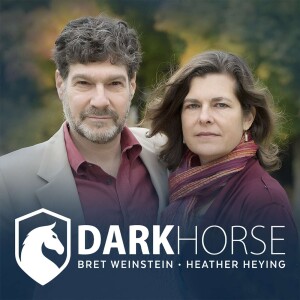Since the dawn of social science, theorists have debated how and why societies appear to change, develop and evolve. Today, this question is pursued by scholars across many different disciplines and our understanding of these dynamics has grown markedly. Yet, there remain important areas of disagreement and debate: what is the difference between societal change, development and evolution? What specific aspects of cultures change, develop or evolve and why? Do societies change, develop or evolve in particular ways, perhaps according to cycles, or stages or in response to survival necessities? How do different disciplines — from sociology to anthropology to psychology and economics — approach these questions? After 10,000 years of history, what does the future hold for culture and society?
Shermer and McCaffree discuss: McCaffree’s experience being trained as a cop, his research on crime, and his thoughts on the recent spike in crime and violence • Is there any way to solve the problem of gun violence? • how sociologists think about human and social action • diversity, equity, and inclusion • Is the current political polarization really worse than it’s been? • cultural evolution vs. biological evolution • horizontal/equalitarian vs. vertical/hierarchical societies • human selfishness and the problem of altruism • between-group and within-group competition and cooperation • fission-fusion in primate bands • Oscillation-Infrastructural Theory of Cultural Evolution • and what the future holds for humanity and society, and more…
Dr. Kevin McCaffree is a professor of sociology at the University of North Texas. He is the author or co-author of five books, co-editor of Theoretical Sociology: The Future of a Disciplinary Foundation and series co-editor (with Jonathan H. Turner) of Evolutionary Analysis in the Social Sciences. In addition to these works, he has authored or co-authored numerous peer-reviewed journal articles and handbook chapters on a variety of topics ranging from cultural evolution to criminology to the sociology of empathy. His two books include Cultural Evolution: The Empirical and Theoretical Landscape, and The Dance of Innovation: Infrastructure, Social Oscillation, and the Evolution of Societies. Along with Anondah Saide, he is one of the two chief researchers for the Skeptic Research Center, and Michael Shermer had the honor of serving on his dissertation committee for his Ph.D. thesis on the rise of the Nones — those who hold no religious affiliation.
More Episodes
The Role of Iran in the Israel-Hamas Conflict
 2023-11-04
2023-11-04
The Secret History of Women at the CIA
 2023-10-31
2023-10-31
America and the Israeli-Palestinian Conflict
 2023-10-27
2023-10-27
Cancel Culture and What to Do About It (Greg Lukianoff & Rikki Schlott)
 2023-10-24
2023-10-24
Robert Sapolsky on Free Will and Determinism
 2023-10-17
2023-10-17
Armageddon in the Middle East? (David Wolpe)
 2023-10-13
2023-10-13
Should Employers Pay For Emotional Labor?
 2023-10-10
2023-10-10
Dan Dennett Looks Back on His Career
 2023-10-03
2023-10-03
How the American Right Became Radicalized
 2023-09-27
2023-09-27
BIG ANNOUNCEMENT
 2023-09-26
2023-09-26
Ways of Thinking That Power Successful People
 2023-09-19
2023-09-19
How to Fight for Truth and Protect Democracy
 2023-09-12
2023-09-12
The Law vs. Separation of Church and State
 2023-09-05
2023-09-05
Based on DNA Testing, Only One Twin Was Granted U.S. Citizenship. Why?
 2023-09-01
2023-09-01
Evidence of Aliens? Harvard Astronomer Avi Loeb
 2023-08-29
2023-08-29
Slavery in the U.S. Analyzed by a Pulitzer Prize-Winning Lawyer and Historian (Ed Larson)
 2023-08-22
2023-08-22
Maybe "Good Enough" Is Actually Enough? When Perfectionism Backfires.
 2023-08-15
2023-08-15
Is a Human Life Worth $10 Million or Only $187,000? (Bjorn Lomborg)
 2023-08-08
2023-08-08
Why We Get Fooled
 2023-08-01
2023-08-01
The Saad Truth About Happiness
 2023-07-25
2023-07-25
Create your
podcast in
minutes
- Full-featured podcast site
- Unlimited storage and bandwidth
- Comprehensive podcast stats
- Distribute to Apple Podcasts, Spotify, and more
- Make money with your podcast
It is Free
You may also like

Sasquatch Chronicles


Radiolab


The Confessionals


DarkHorse Podcast


Sasquatch Odyssey


- Privacy Policy
- Cookie Policy
- Terms of Use
- Consent Preferences
- Copyright © 2015-2024 Podbean.com



 iOS
iOS Android
Android